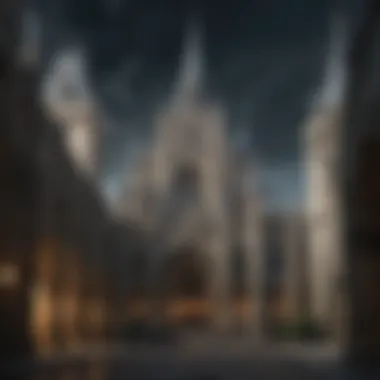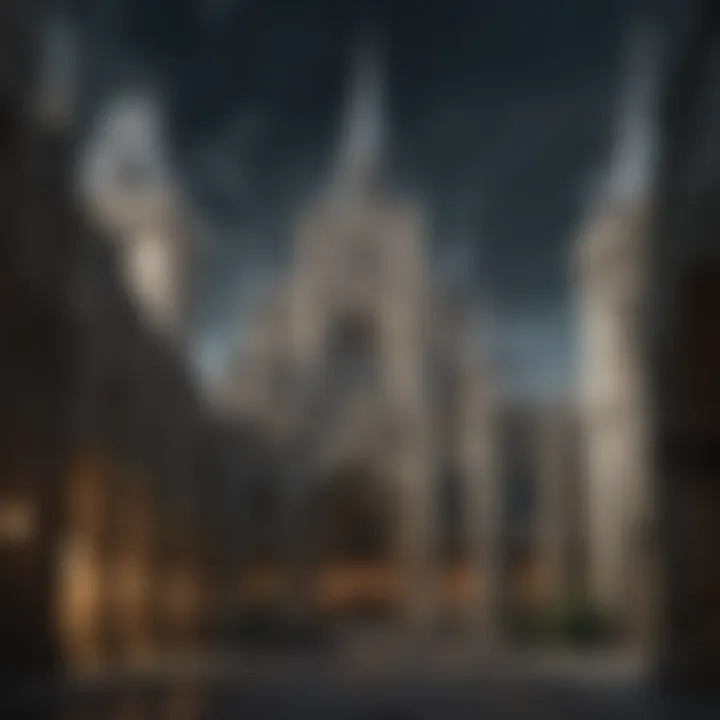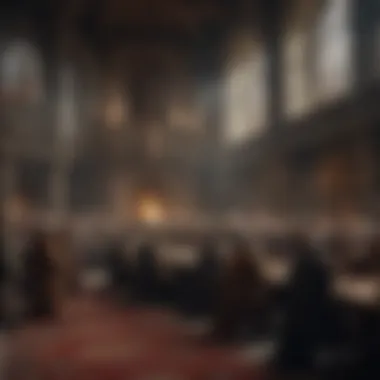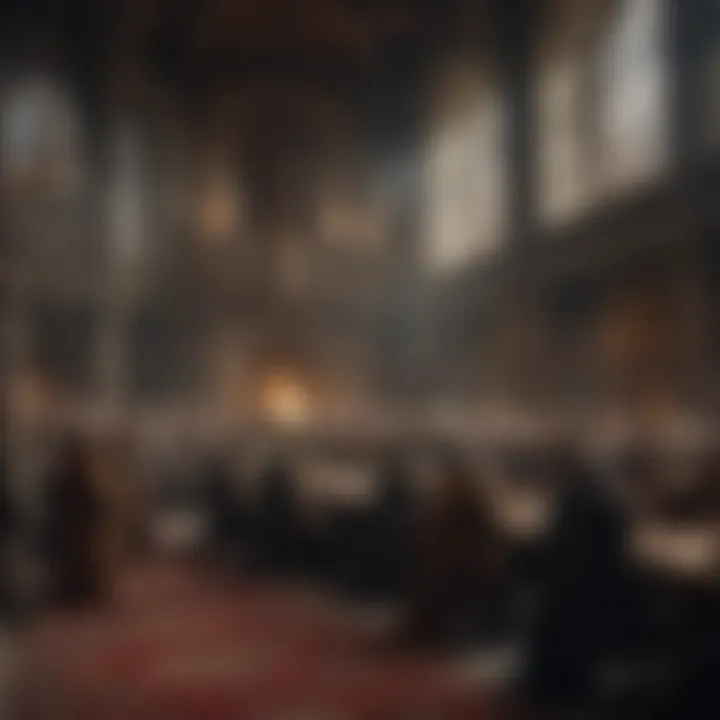The Citadel: Knowledge and Power in Westeros


Intro
In the world of Westeros, the Citadel stands as more than just a grand structure; it is a living representation of knowledge and a vital cog in the machinery of the realm. For those immersed in the lore of Game of Thrones, the Citadel emerges as a symbol of wisdom, learning, and the often-overlooked influence of the think tanks behind the throne. Here, we will peel back the layers of this institution: its historical roots, architectural marvels, and the integral part it plays in shaping the political landscape of Westeros through its maesters.
The Citadel not only houses vast scrolls and tomes filled with the histories of the Seven Kingdoms, but it is also a training ground for the maesters—masters of all trades who serve as advisors, healers, and scholars. Their role goes beyond mere counsel; they are often the silent players in the game of thrones, wielding influence that can shift allegiances and alter the lives of kings and commoners alike.
As we delve deeper, the interconnections between the Citadel and key characters become clear, revealing how knowledge and power intertwine. In the end, the Citadel is much more than a repository of learning; it is a testament to the complexities of authority, the weight of tradition, and the ever-present battle between innovation and the status quo.
Historical Context of the Citadel
The Citadel stands as a monumental symbol of knowledge and scholarly pursuit in the realm of Westeros. It is important to grasp its historical context, as this lays the foundation for understanding how learning and politics intertwine in the narrative of Game of Thrones. Established as a center of expertise, the Citadel has not only influenced the lives of its scholars but also shaped the larger socio-political landscape of Westeros. Emphasizing learning in a world riddled with conflict, the Citadel presents a unique contrast to the often violent nature of the realm's power struggles.
Origins and Founding
The Citadel traces its roots back to the aftermath of the Age of Heroes, a time shrouded in legend. According to lore, it was founded by Aemon, a Targaryen scholar, who was guided by a vision to create a sanctuary for learning and healing. Built on the island of Oldtown, its initial purpose was clear: to accumulate knowledge, train healers, and support the nobility’s understanding of medicine and politics. The old stones of the Citadel whisper tales of that early ambition, a place where wise minds congregated to share their thoughts and discoveries.
The first maesters wore chains fashioned from various metals—each link representing a distinct area of study. This act reinforced the idea that knowledge is multifaceted and not easily defined by a single discipline. Some procrastinators might say the Citadel was merely a cozy library, but to those who sought wisdom, it was a beacon.
Evolution Over the Ages
Over the centuries, the Citadel’s role evolved significantly. The political landscape of Westeros is in a constant state of flux, and the Citadel adapted with it. As noble houses rose and fell, the necessity for stable advisors became paramount. Maesters transitioned from simple healers to key players in the court’s dealings, often acting as political advisors or even spies for their lords.
As time passed, the Citadel also expanded its collection of knowledge. The vast Library came to house tomes that recorded everything from the history of the Seven Kingdoms to advanced medical practices. This evolving mission highlights a critical point—a well-informed leader is less likely to make rash decisions, an insight that many would do well to internalize.
Today, scholars at the Citadel weave together that rich tapestry of history and lore, preserving not just knowledge but the wisdom of generations. They have witnessed the rise of dragonlords and the cataclysmic fall of empires, using every lesson learned to combat ignorance and stagnation.
"Knowledge is power, but it’s also a double-edged sword in the game of thrones. Decisions must be as measured as they are informed."
Throughout its existence, the Citadel has served as a bridge between the ancients and the modern world. As it continues to influence Westerosi politics, its origins and evolution remain vital to understanding its present role as an intellectual leader. With each tome added to its shelves, the Citadel stands not only as a pillar of knowledge but also a testament to the enduring quest for wisdom in a chaotic world.
Architectural Features
The Citadel stands as a monumental institution in the heart of Westeros, not merely for its role in the realm's politics and knowledge but also for its distinct architectural features. Each building and structure within its walls tells a story, reflecting the Citadel's purpose and the legacy it carries. From the grandiosity of its Great Hall to the vast maze of knowledge contained within the Library, the architectural elements combine functionality with symbolism, creating a backdrop that serves both the mind and the spirit of its scholars. Understanding these features is crucial in appreciating the Citadel's role as a center of learning and influence.
Layout and Design
Great Hall
The Great Hall of the Citadel serves as the heart of the institution, a place where maesters gather, discuss, and debate issues ranging from the mundane to the monumental. Its sheer size and impressive stone arches are designed not only for aesthetics but for acoustics, ensuring that every voice can be heard. The high ceilings and banners representing the various houses of Westeros give the hall a sense of unity amidst diversity.
One key characteristic is its open layout, which fosters an environment of collaboration. It is beneficial for the Citadel's purposes because it allows for large gatherings, encouraging the sharing of ideas and knowledge. A unique feature of the Great Hall is its intricate tapestries, which narrate some of the most significant events in Westerosi history. However, a potential disadvantage might be its capacity to distract those present; the stories depicted can often lead the mind astray from pressing discussions.
Library
The Library represents the core of the Citadel's mission to preserve and disseminate knowledge. Unlike any other place in Westeros, it comprises a vast collection of scrolls and tomes, some dating back centuries. Its layout is labyrinthine, with ancient stone walls lined with towering shelves, creating a sanctuary for scholarly pursuits.
A notable characteristic of the Library is its climate control systems, designed to protect the delicate manuscripts from the ravages of time. This is crucial, as the goal of the Citadel is to ensure that the wisdom of ages does not crumble away. The unique feature here is the black library, where forbidden texts are stored—texts that are often sought after despite their precarious nature. The only disadvantage might be its intimidating vastness, which can discourage less confident scholars from exploring its depths.
Tower of the Hand
The Tower of the Hand serves as both a residential space and a working area for the Hand of the King. Its design is somewhat secluded yet strategically placed, allowing those in power to convene away from the bustle of the Citadel. Not only does it emphasize the importance of the role, but it also acts as a physical reminder of the connection between knowledge and authority.
One key feature of this tower is its observation deck, providing near-panoramic views of Oldtown. This is beneficial, as it symbolizes the overseer role of the Hand, allowing them to keep an eye on the shifting political landscape. The downside may be the isolation that comes with such a grand location; it can become a piece of solitude in a world that thrives on interaction and dialogue.
Symbolism in Architecture
Beyond functionality, the architecture of the Citadel is steeped in symbolism. The stone, sturdy and timeless, signifies the weight of knowledge and the responsibilities carried by maesters. Each feature—from the rounded arches symbolizing unity to the tall towers representing ambition—conveys messages about the nature of learning and governance.


The careful planning and execution of these buildings demonstrate a profound understanding of how space can influence thought and behavior. As those walk through the halls and chambers of the Citadel, they are not merely traversing a physical space; they are engaging with centuries of wisdom that radiate through the very walls.
"Architecture is frozen music."
This quote reflects the Citadel's design ethos; every structure is a note in the grand symphony of knowledge that defines this significant place.
Role of Maesters
The role of maesters in the Citadel holds a pivotal place in the landscape of Westeros. They are not just scholars tucked away in dusty libraries but serve as the backbone of knowledge and wisdom, disseminating vital information across the realm. Every noble house, from the mighty Lannisters to the resilient Starks, engages their own maester to leverage their expertise in various fields.
Maesters embody the blend of traditional education and practical experience, trained rigorously in the arts of healing, reading, writing, and diplomacy. They serve not only as advisors but also wield the power of knowledge that can shape decisions and alter the ebb and flow of power among the elite. Through their counsel, they influence the political landscape, offering insights that affect battles, marriages, and alliances.
As the keepers of lore, maesters also play an essential role in preserving history and providing context to the complex relationships that govern the realm. They are not mere passive observers; they wield their knowledge like a sword, cutting through deceit, manipulation, and conflict. Such multifaceted responsibilities make the role of maesters indispensable to Westeros.
Training and Education
Training to become a maester at the Citadel is no walk in the park. It requires years of dedication and a voracious appetite for learning. Candidates must master various disciplines, including history, medicine, economics, and even the intricacies of poisons and herbs.
In this environment, the line between being a scholar and being a practical thinker blurs. Maesters are often pushed to think critically and question traditions, making their education both comprehensive and pragmatic.
Duties and Responsibilities
Maesters juggle several key duties, each contributing to their overall significance in Westerosi society.
Advisors to Nobility
Advisors to Nobility solidify the maesters' significant influence. They tend to be deeply integrated within the households of lords and ladies, offering guidance on matters ranging from strategy to health. Their unique knowledge provides invaluable insights that can influence a lord’s decisions profoundly.
For instance, during internal conflicts, a maester's wisdom about history can provide a perspective that could steer a lord away from a catastrophic misstep. Their access to a variety of sources of knowledge sets them apart as trustworthy companions for navigating the murky waters of politics.
However, this role is not without its downsides. The advice offered can sometimes be swayed by personal biases or ulterior motives. A maester may unintentionally prioritize the interests of one noble over another, leading to tension. Navigating these waters can be precarious, increasing the stakes in their relationships with the nobility.
Medics and Healers
Maesters frequently function as Medics and Healers for the populations they serve, displaying extensive medical knowledge garnered from both ancient texts and hands-on experience. They are equipped to deal with all manner of ailments, thereby establishing a bond with the common folk.
Their unique position allows them to bridge the gap between the upper and lower classes through their healing practices. However, the pressure is immense. A single misdiagnosis can ripple through the community, shaking trust in their abilities.
Despite the risks, their roles as healers can offer a deeper understanding of life and death, giving them insights that can further refine their political counsel when they return to their lords.
Transcribers of Knowledge
Lastly, maesters are the Transcribers of Knowledge, a role that forms the very foundation of the Citadel’s vast library and its reputation as a keeper of history. They tirelessly copy essential tomes, ensuring that wisdom is not lost to the ravages of time.
This ability to write and transcribe knowledge can sometimes put them in positions of power, especially regarding matters of state. For instance, they can effectively shape narratives through how history is recorded. There’s a certain authority that stems from accuracy and detail that can influence future generations’ interpretations of events.
Nonetheless, the process can also amplify misinformation or biased perspectives if not handled with care. The importance of accuracy cannot be overstated; a single misstep here can lead to a series of historical inaccuracies that reshape public perception.
In summary, the role of maesters is both enriching and challenging, placing them at the nexus of knowledge, power, and the intricate social fabric of Westeros. Their contributions are vast, yet the risks they face heighten the significance of their work, making them indispensable in the realm.
Collection of Knowledge
In the narrative tapestry of Westeros, the Citadel stands as a bastion of learning, housing an extensive collection of knowledge that spans centuries. The Citadel’s collection serves not only as an archive of information but as a beacon for those devoted to understanding the world around them. Knowledge, often seen as power, is meticulously preserved here, reflecting the complexities of human experience — from the rise and fall of dynasties to the nuances of medicine and the natural sciences.
The Library of the Citadel
At the core of the Citadel lies its library, a grand space where countless tomes and scrolls reside. This library is no ordinary building; it's a veritable treasure trove of wisdom, curated over generations by maesters who dedicated their lives to the pursuit of knowledge.
- Architectural Marvel: The library’s architecture is imposing yet inviting, with high ceilings and walls lined with ancient scripts. It resembles a labyrinth, where knowledge hides in nooks and crannies waiting to be discovered.
- Variety of Texts: The collection includes histories, treatises on medicine, scripts about the mystical aspects of Westeros, and even ephemeral accounts of events. Each scroll and volume tells a story of its own, intertwining the past with the present.
- Access and Study: Students and scholars are encouraged to delve into this treasure trove. However, access isn't unrestricted. One must earn their way into the inner sanctum through rigorous training as a maester, a reflection of the belief that true wisdom comes through dedication and discipline.
This library is a world within itself, a place where scholars’ whispers intermingle with rustling pages, creating an atmosphere steeped in reverence for knowledge.


"In the Citadel, knowledge is not just gathered; it is revered, safeguarded within the halls that echo with the footsteps of those who sought answers and found questions instead."
Preservation of History
The preservation of history is paramount at the Citadel, as it serves as both a guardian and a storyteller. Here, the past is not merely a collection of dates and events; it’s a living entity that informs the present.
- Chronicling Events: Maesters engage in the painstaking process of documenting events across Westeros, highlighting significant moments like the War of the Five Kings or the rise of House Targaryen. Each account is treated with a sense of importance; the idea is that history can guide future decisions as much as it informs past actions.
- Lessons Learned: The library isn’t just about what has happened, but also about what can be learned. Maesters often compile reports analyzing outcomes, providing insights into the behavior of leaders, the consequences of wars, and the cycles of alliances.
- Cultural Heritage: Knowledge isn’t solely about politics. The preservation efforts extend to literature, art, and the social fabric of various cultures within Westeros. This broad spectrum of preserved knowledge not only enriches the understanding of Westeros' diverse peoples but also fosters respect and appreciation among its scholars.
As a result, the Citadel's commitment to knowledge preservation plays a crucial role in shaping the consciousness of the realm. It is a reminder that while the future is unwritten, the past provides an invaluable roadmap.
Influencing Westerosi Politics
The power dynamics within Westeros are a delicate tapestry woven with threads of knowledge, tradition, and formidable alliances. The Citadel, as the bastion of learning in this realm, not only houses knowledge but also serves as a pivotal influencer in the intricate politics of Westeros. Maesters, the learned scholars and advisors trained within its walls, play a crucial role in shaping the fate of kingdoms. Their influence reaches far beyond the confines of the Citadel, extending into the courts of kings and the hearts of lords.
Political Ties and Alliances
Political affiliations in Westeros are often as shaky as a tightrope walk. Here, allegiances can shift faster than the wind changes direction. Maesters from the Citadel, sometimes seen as mere advisers, are woven into the very fabric of Westerosi politics through their connections and affiliations. Their training fosters a deep understanding of political maneuvering, lending them critical insight into the minds of the powerful.
- Advising the Powerful: Maesters like Aemon and Ebrose have offered counsel to numerous lords and ladies throughout the ages. They are often privy to secret information and political intrigue, becoming valued assets to those in power.
- Marriages and Alliances: The significance of strategic marriages cannot be overstated. Maesters help navigate these partnerships by providing counsel on alliances that can solidify or shatter political stability. Knowledge about family histories and potential conflicts aids in making wise decisions.
- Communicating with the Realm: The ability of a maester to transmit messages and information can alter the course of events in Westeros. Consider the way messages were sent between the different houses; these lines of communication were critical during times of war and peace.
Through these interactions, maesters craft a network of alliances that can steer the destinies of houses. Their wisdom is as essential as any army when it comes to maintaining a household's grip on power.
Maesters as Spies
In the shadows of castles and courts, maesters often play a role that is darker than mere advisers. The duality of their position—both scholars and spies—allows them to gather intelligence that can be used to further their own interests or those of their appointed lords. This covert nature can also lead to ethical dilemmas.
- Gathering Information: Utilizing their role, maesters have often found themselves collecting secrets and information about rival houses and political factions. Whether it’s overhearing gossip or observing behaviors during gatherings, they note details that can be invaluable.
- Follow Orders: While a maester is bound by an oath to serve his lord, this can sometimes put them in the uncomfortable position of being a pawn in a larger game. They may find themselves having to execute the wishes of their lord even when those actions conflict with their personal morals.
- Playing Both Sides: There are instances when a maester may find favor with different factions, using this to their advantage. They might share intelligence with one party while maintaining a moving dialogue with another, enhancing their own position and power.
"Knowledge is power, and those who wield it can influence more than just the course of a battle; they shape the very fabric of society itself."
The dual role of maesters as both scholars and spies illustrates a complex interaction that can alter the political landscape in Westeros dramatically. Knowledge is not just preserved; it is wielded, and the Citadel’s influence permeates every corner of the realm.
Significant Characters Associated with the Citadel
The Citadel stands as a bastion of knowledge in Westeros, and its significance is further underscored by the characters who emerge from its hallowed halls. These individuals shape the narrative, embodying various facets of wisdom, ambition, and morality.
Archmaester Ebrose
Among the most notable figures within the Citadel is Archmaester Ebrose, a learned man recognized for his extensive expertise in medicine. He represents the pinnacle of knowledge that the Citadel aims to disseminate. Ebrose serves as a mentor to aspiring maesters, imparting crucial medical wisdom that remains vital during times of war and plague. His influence extends beyond mere instruction; he acts as a bridge between the scholarly world and the chaos that often engulfs Westeros.
Ebrose's character showcases the tension between scholarly pursuit and real-world application. He is tasked with understanding the dynamics of illness and health, making him a crucial player during the tumultuous events in the realm. The debates he partakes in concerning ethics in medicine highlight his importance—not only as a medical professional but also as a moral compass.
Samwell Tarly’s Journey
Samwell Tarly's trajectory through the Citadel serves as an intriguing narrative of personal growth and self-discovery. Originally seen as a coward, Sam evolves into a beacon of knowledge and bravery. His journey through the hallways of the Citadel illustrates the struggle of an unassuming individual breaking free from societal expectations. The audience witnesses Sam's transition from a timid boy burdened by his family's legacy to a determined scholar with the potential to impact the realm profoundly.
The Citadel, in Sam’s journey, represents both a sanctuary and a crucible. As he wrestles with the challenges of academia, his character development intertwines with the broader narrative of Westeros. The friendships he cultivates there, particularly with Gilly, reveal the connections that knowledge fosters—even amidst personal trials. Sam's acquisition of vital information, especially regarding the true threat of the White Walkers, positions him as an unexpected hero against the backdrop of traditional valor.
Maester Aemon
Maester Aemon stands out as a poignant figure within the Citadel’s lore. His rich backstory as a member of House Targaryen adds a layer of complexity to his character. Despite being encumbered by his family's legacy, Aemon's decision to forsake power in favor of the life of a maester marks a deep commitment to his vocation. His wisdom and sense of duty resonate throughout the series, particularly in his role at the Wall, where he offers counsel and guidance to the Night's Watch.
Aemon’s gentle yet stern demeanor reflects the internal conflict between knowledge and the weight of lineage. He embodies the idea that true strength comes not from power but from wisdom. His heartfelt advice to Jon Snow showcases the importance of mentorship, reinforcing how the Citadel shapes not only scholars but also future leaders. Aemon’s legacy exemplifies the overarching themes of sacrifice and the pursuit of knowledge against the backdrop of Westerosi politics.
"Knowledge is not the same as wisdom, and guidance is not always what the world expects."
Through figures like Ebrose, Samwell Tarly, and Aemon, we see the Citadel not just as a physical institution but as a symbol of the convergence of knowledge, power, and personal growth. These characters enrich the narrative, providing depth to the representation of the Citadel in the world of Westeros.
Tension Between Knowledge and Power


The relationship between knowledge and power at the Citadel is intricate and layered. This tension is pivotal to understanding the very essence of the institution, as it embodies not just the pursuit of wisdom, but also the wielding of that wisdom in the sometimes ruthless landscape of Westeros. At its core, the Citadel represents a reservoir of knowledge that can either uplift or dominate, depending on who is in control.
Conflicts Arising from Knowledge
Knowledge, while often seen as a benevolent pursuit, can also fuel conflict. In the context of the Citadel, disagreements often surface regarding the interpretation and application of knowledge. For example, the maesters stand at the crossroads of traditional wisdom and current need. When a particular set of knowledge contradicts the desires of influential houses, conflicts can ensue. The classic rivalry between the maesters and the Starks showcases this vividly. On one hand, you have wisdom grounded in history and academics, and on the other, the pressing political realities that demand swift and decisive action.
Moreover, the struggle for relevance is ever-present among the maesters. With the rise of political factions and their interests, there are times when knowledge becomes a weapon rather than a tool for enlightenment. This is particularly vivid in the context of the War of the Five Kings, where various factions cherry-pick knowledge to justify their ambitions.
Resistance to Change
Resistance to change is deeply ingrained in the culture of the Citadel. This reluctance is not simply derision of new ideas; it is also a protective response to the potential ramifications of altering established norms. Established maesters may cling to what has always been done, choosing nostalgia over progress. This becomes quite pronounced when they approach critical issues, such as the White Walkers, with skepticism instead of urgency.
Many feel that new ideas threaten the very foundations of the institution. The thought of incorporating new methods or re-evaluating ancient doctrines often raises alarms that prevent the Citadel from adapting swiftly to the changing tides of Westerosi politics. The conflict between the old guard and those who advocate for a modernization of thought keeps the institution under a level of constraint that is both self-imposed and, in some ways, dangerous.
"Knowledge is power, but only if it’s wielded wisely; otherwise, it can just as easily become a cage."
Such a tension is indicative of larger themes within the series, where power dynamics dictate not only political stability but also the reach and effect of knowledge. The fear of upheaval leads to a paradox: the Citadel, a institution dedicated to knowledge, also becomes entrenched in the very power struggles it aims to enlighten. Thus, understanding this multifaceted tension is crucial to grasping the overall role the Citadel plays in Westeros.
The Citadel in Cultural Context
The Citadel stands as more than just a stone edifice in the fictional land of Westeros; it’s a symbol representing the weights of knowledge, tradition, and the enduring struggle between wisdom and authority. In the context of Game of Thrones, the Citadel highlights themes that resonate deeply throughout the narrative, encapsulating the significance of learning while revealing the darker undertones of power dynamics. The interplay of these themes showcases how crucial the Citadel is to understanding the socio-political fabric of Westeros.
Literary References
Literature, across the ages, has held the Citadel in a prominent light. George R. R. Martin's works often draw upon historical pedagogies, where scholars serve not only as advisors but often as unseen puppeteers of fate. One notable reference can be traced to the role of the maesters, who are akin to medieval scholars. Their duty goes beyond mere education; they act as caretakers of knowledge, akin to monks in ancient manuscripts, and play pivotal roles in critical events.
For example, the history of the Citadel echoes real-world institutions known for their repositories of knowledge, like Alexandria in ancient Egypt, serving as a reminder of the cultural heritage emblems of enlightenment. The intricate histories shared in the tomes within the Citadel’s library shape the political landscape of the realm, drawing disturbing parallels with the current age where information is power.
The Citadel also reflects characters' journeys through literature exploring their moral dilemmas. Samwell Tarly’s transformative arc illustrates how a character rooted in insecurity can blossom under the right pursuit of knowledge—showing us that the quest for understanding often leads to profound personal transformation, much like the journey of real-life scholars throughout history.
Cinematic Portrayals
In the realm of Game of Thrones, the visual representation of the Citadel is striking. The towering spires and the labyrinthine library are more than backdrops; they carry weight in narrative symbolism. Each scene nestled within its stone walls breathes life into the dialogue about knowledge versus blind adherence to power. Camera angles often emphasize the grandeur of the Citadel, signifying its role as a guardian of ancient wisdom, while also showcasing moments of human frailty among its inhabitants.
The show artfully underscores the tensions between maesters and the ruling class, showcasing these interactions on screen. For instance, Maester Aemon’s presence imbues the Citadel with palpable gravitas. As the audience watches, we are reminded that knowledge is neither inherently good nor bad; rather, its application can tilt the scales of power dramatically.
"Knowledge is power, but power often corrupts the knowledge."
As Game of Thrones progressed, the Citadel’s portrayal added layers of complexity. It became less of a bastion of unattainable wisdom and more of a proving ground for its guardians. Each character's journey reveals how the cultural legacy of the Citadel becomes interwoven with their personal quests for meaning—highlighting that in the game of thrones, knowledge can be as deadly as a sword.
Through the dual lenses of literature and cinematic interpretation, the Citadel emerges as a profound element of cultural significance. It is a crucible where minds sharpen, ambitions unfold, and destinies intertwine in a tapestry that defines the struggles of Westeros.
Legacy and Impact
The Citadel stands as not just a cluster of ancient stones and towering spires in Oldtown, but as a living testament to the weight of knowledge throughout the tapestry of Westerosi history. Its legacy is woven into the very fabric of the realm, echoing through the corridors of power and the pages of forgotten tomes alike. Understanding the importance of this institution and its ramifications teaches us a bit about the nature of wisdom, power, and the interplay between them.
Enduring Influence on Westeros
The Citadel's impact on Westeros can hardly be overstated. As the cradle of the maesters, it fundamentally shapes the minds that advise the lords and ladies of the Seven Kingdoms. These men dedicate their lives to studying the arts of healing, politics, and sorcery, thus molding the very trajectories of noble houses. The Citadel serves as a beacon of reason in a land often clouded by blood feuds and superstition.
For instance, when the realm was gripped by the chaos of war, it was the maesters' counsel that stated logical paths through turbulent times. Characters like Archmaester Ebrose underscored the institution's influence when making critical decisions during crises, including those involving dragons and winter-touched horrors.
Additionally, the library within the Citadel houses scrolls and books chronicling ages past, unseen by many who tread the realm's paths. This continual collection and preservation of knowledge mean the Citadel educates future generations while preventing history from repeating its vile mistakes. It has offered insights to hold back players from engaging in fruitless conflicts which may ignite flames of war yet again.
Lessons from the Citadel
The important lessons one can draw from the Citadel extend beyond mere political maneuvering. Perhaps the most profound insight relates to the balance between knowledge and power. Knowledge can be a double-edged sword. It has the potential to save lives but can also set into motion destructive ambitions.
Consider these key takeaways about the Citadel's philosophy:
- Seek Understanding, Not Domination: The maesters value learning over vanity. Those who enter its halls do so with genuine curiosity rather than a thirst for personal power, reminding us why education should prioritize enlightenment over ambition.
- History Holds Wisdom: Time and again, the importance of understanding history is a theme prevalent throughout the narrative. The School of Maesters teaches its students to learn from past events so they might guide the living toward better decisions.
- Interconnectivity of Knowledge: The Citadel is a confluence of various disciplines. The blend of medicine, astronomy, and history exemplifies the complexity of any problem: solutions often springs from interdisciplinary approaches.
"Knowledge fills a man; it does not starve him for power. It strengthens reason against folly and forms a bridge to unity where discord exists."
In essence, the Citadel embodies a legacy that urges more than just academic pursuits. It calls for the application of knowledge as a means of fostering resilience and unity in a divided world, serving as a mantle for wisdom through the ages.



